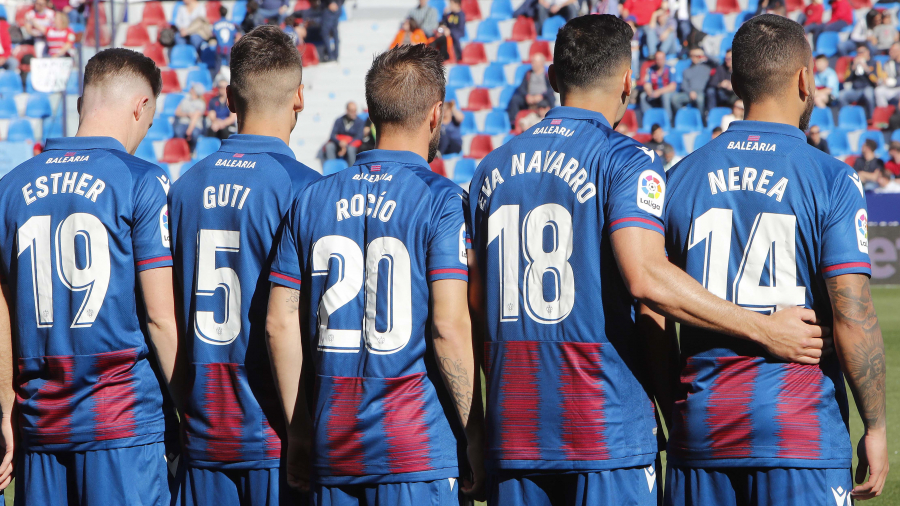
- Psychologists from Athletic Club, Levante UD, Sevilla FC and Real Valladolid explain how footballers are being trained to manage confinement and how this may help others.
- Maintaining routines, organising daily activities and continuing with training are some of the keys to returning in the best condition when the competition returns.
The COVID-19 outbreak has caused a sudden stoppage to everyday activities and led to the isolation of millions of people, including all Spanish professional footballers. The situation is new and uncertain for everybody which creates significant mental strain.
For LaLiga players, the difficulties are no different. However thanks to the role of club psychology departments, best practice is on offer that can help them to manage a challenging situation, using techniques that can help the wider population.
Respecting routines
As Juan Manuel Gamito, coordinator of the psychology department for the Sevilla FC academy, explained: "A performance athlete is fundamentally, before an athlete, a person, so the effects they suffer are similar to that of any other citizen."
However when it comes to routine, footballers follow a concrete schedule that can provide some welcome distraction during a quarantine. “Athletes at the top level are people who are used to having a very marked rhythm of activities,” Gamito continued. “They have a set agenda, sometimes a week in advance, from the time of getting up and going to bed, to the specific food plans, through to hours of training, competition and rest.”
"Furthermore, these are directives received from others (such as the coach or physical trainer), so they are used to being 'directed' in this sense,” he added. “So it is difficult to be in a new personal space in which they have to organise things autonomously.”
Taking this into account, Gamito’s advice is to “schedule the day”, so that players remember what to spend time on. Within this agenda, "fixed times" should be maintained, such as meal and sleep times, as carefully as possible.
"It is good to focus on routines and try to find a space to continue training, taking care of food and, above all, keep on speaking with others so that the change is not so noticeable," added David Rincón, a psychologist at Athletic Club.
Coping with uncertainty and stress through planning
Although a footballer is somewhat more prepared for moments of stress and accustomed to strict routines and guidelines, the uncertainty of the current situation can still be a significant challenge.
“Not knowing what is going to happen with the competitions, not knowing when it can be resumed or if the objectives set at the beginning of the season can be met is very difficult for the players,” explained Lander Hernández, as head of the department of psychology and training at Real Valladolid CF.
For Gamito, it is of great importance to “time out the activities of the day” and “to make a list of those activities that we most enjoy and to schedule them; either at the beginning of the day or at the end.”
This organisation can help to better cope with the COVID-19 outbreak which in many countries is preventing people from walking on the street and other basic outdoor exercise.
As Hernández points out, “This can cause the brain to demand the exercise to which it is accustomed. Not carrying out these activities can increase levels of anxiety so needs to be controlled.”
Training the body as well as the mind
With external pressures particularly high, additional attention must be paid to mental health, a topic that LaLiga players are already accustomed to.
"During day to day training sessions the footballer not only works the physique but is subjected to significant cognitive training," explained Juan Miguel Bernat from the high-performance psychology department of Levante UD. "Although they are training at home now, if the coaching staff does not continue to provide this training then the player may not switch off mentally." This could affect sleep, among many other issues, he notes, adding: "It is important for the technical teams to provide a cognitive workout for the players, for example, an analysis of their season, their areas to improve or a study of rivals."
Cognitive training is further helped through a sense of competition, particularly within athletes. “Footballers love to challenge themselves, beat rivals and break records” Bernet comments. “In this situation, players can continue being active but can be left without the possibility of competing and therefore without one of their fundamental motivations.”
“You must be aware that although you do not see your rival, you are competing against them every day,” he advises. “You have to make yourself aware that your rivals are in the same situation and that whoever takes the best advantage of these days will return to LaLiga with a competitive edge."
Digital tools to provide support
During a period of home confinement, episodes of anxiety and depression are common. For this reason, clubs are focused on transmitting clear information about psychological keys, studies, routines or nutrition. Athletic Club for example is sending such material to all players and coaches in all areas of the club, as well as opening up digital platforms to them. "With some teams some sessions are being done through digital platforms to talk about how we are coping with this situation and what the positive aspects are,” commented Rincón. “It is important for everyone to express how they are feeling."
Sevilla FC has also developed such correspondence to disseminate among the players, staff and their families, in which recommendations are given to help manage the quarantine. “This helps to not only to focus on not spreading the virus, but to prevent the creation of excessive stress or alarm both in players and their families,” Gamito said.
For its part, Levante UD also holds individual meetings with the players as a matter of routine. During this period, mental health training meetings are being held by videoconference. In addition, daily contact is maintained with the players to take an interest in their personal situation. “Working with players who are homebound and alone is especially important,” Bernat said. “Let's bear in mind that the context is varied among players from other countries, players with children, players with partners or single players. We try to adapt to the reality of each one.”
Fighting as a team
With term challenges ahead, communities around the world will need to work together. Within football clubs, this is already a well understood message and the notion of teamwork will form a key part of all psychological training.
At Real Valladolid CF, the club’s youth teams are trained with the message of “belonging to a group” and fighting for a common purpose, namely, to overcome the current pandemic. In the same way as approaching a football match, the they are taught to understand the different roles that everyone will have and how to best facilitate hospital, police or military personnel to meet their own challenges.
This team approach extends to the household and serves as a useful approach for others who are required to be indoors. "We have explained the importance of taking on and dividing tasks at home and have players with tools for conflict resolution", said Lander Hernández, who manages psychological training for the club’s youth teams.
In a constantly evolving situation, nothing can be certain and difficulties are being faced by everyone. But as a general guide, Levante UD offers its approach that has already been shared among the club. “Focus on the present; structure the tasks of the next day; make sense of each day by setting goals, try not to alter the start and end times of sleep; do not hide your restlessness; talk about it with the closest people to you; and try to accept the situation,” Bernat concluded.
